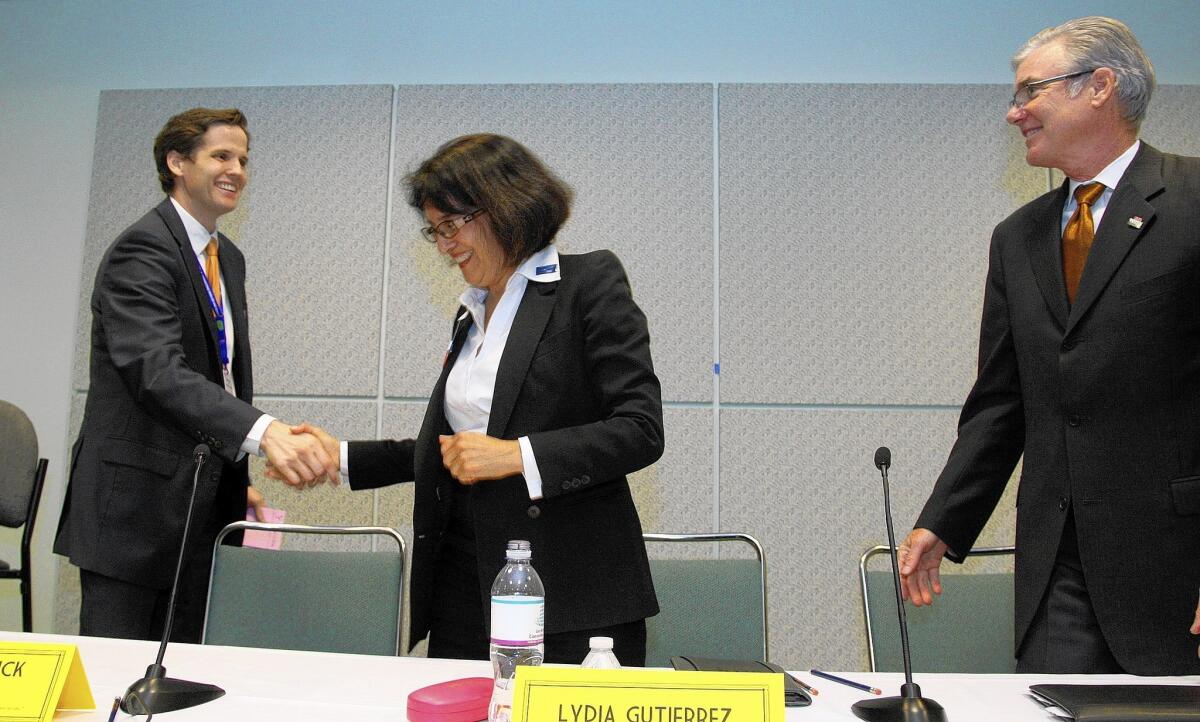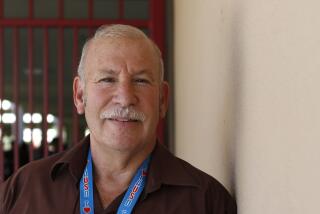Opposing visions for education on view in state superintendent race

In next month’s contest to lead the state’s public schools, the two front-runners represent opposing forces within education over how best to improve student achievement.
Tom Torlakson, the Democratic incumbent, champions teachers and their unions, which dislike the nation’s growing reliance on standardized tests, call for more funding and fight against eroding job protections.
Marshall Tuck, the favorite of a core of philanthropists and activists, wants more limited job security for instructors as a way to weed out weak performers and improve the teaching corps. Also a Democrat, he talks of shaking up a system that has settled for gradual improvement in test scores and graduation rates. Before raising new revenue, he said, he would spend existing dollars more effectively.
The nonpartisan race for the state superintendent of public instruction has become a window into differing, and influential, visions for public schools.
“These fights are very much playing out in the states, between the union wing and the education-reform wing,” said Frederick Hess, director of education policy studies at the American Enterprise Institute, a conservative think tank in Washington, D.C.
“This is probably the highest-profile referendum that we’re going to see this year,” said Hess, who generally sides with the union critics he regards as reformers.
A third candidate, veteran teacher Lydia Gutierrez, a Republican with unconventional views, has been unable to attract comparable funding. She supports current job protections for instructors, much like Torlakson. But unlike Torlakson and Tuck, she would undo state learning goals, called the Common Core, adopted by California and 43 other states.
The education department has an annual budget of $65 million to oversee $70 billion in education funding. The superintendent interprets and enforces the vast number of education laws, oversees standardized testing and, more recently, has helped school districts adapt to the new learning goals.
The office also can choose to buttress, oppose or shape policies put forward by the governor, the state Legislature and the federal Department of Education.
Torlakson, a resident of Contra Costa County, is seeking a second and final four-year term. Since 1980, he’s been a full-time elected official. Before that, he taught full time for about seven years.
The 64-year-old incumbent lines up philosophically with Gov. Jerry Brown and other top state Democrats in siding with unions, which have opposed key education policies of the Obama administration.
In conjunction with Brown, for example, Torlakson refused to establish new rules linking a teacher’s evaluation partly to test scores. The state’s resistance was a factor in the loss of a lucrative federal grant during the recent recession.
Torlakson insists that the cost of complying with federal guidelines would have offset the benefit. As for the emphasis on test scores, “I didn’t agree with that and the governor didn’t agree with that.”
California later resisted federal pressure to administer additional standardized tests. Students already were scheduled this year to try out a new, computer-based test linked to the new learning goals. Federal officials also wanted to continue the older tests, so that schools and teachers could be evaluated during the transition.
After threatening to withhold funding, the Obama administration accepted California’s plan to administer only the new exam. The new test, given across several states, was beset with time-consuming technical problems.
Torlakson is hard-pressed to identify a major issue on which he disagreed with the unions since taking office.
Tuck, meanwhile, can count Obama’s education team among his philosophical allies, along with like-minded politicians such as Sacramento Mayor Kevin Johnson and former L.A. Mayor Antonio Villaraigosa. Their supporters call them reformers; their critics call them privatizers.
They have battled with teachers unions and, among other things, promoted the growth of independently managed, publicly funded charter schools. Most are nonunion. Some are for-profit entities with corporate investors.
Tuck does not support for-profit charters.
But, like many of his backers, Tuck opposes the current system for laying off teachers, which is based mainly on seniority. He thinks performance evaluations should become the major consideration. He also objects to regulations that make it harder to fire teachers than to fire other state employees.
Tuck, 40, is a UCLA and Harvard Business School graduate who lives in Mar Vista. For four years, he worked as president of Green Dot Public Schools, which operates independently managed charter campuses. Unlike most charter groups, Green Dot is unionized.
Tuck then headed the Partnership for Los Angeles Schools, a nonprofit under control of then-Mayor Villaraigosa. The group took over some of the city’s lowest-performing schools, generally achieving increases in test scores. Overall student achievement remains relatively low in the upper grades.
Tuck wants to simplify state education laws and provide more freedom for districts and schools to try new approaches.
“I’m running because I believe we need fundamental changes,” he said.
Tuck’s fundraising is keeping pace with Torlakson’s, but not with outside spending on the candidates’ behalf.
Teacher unions and other labor groups are spending about $4 million for independent campaigns and other advertising to reelect Torlakson.
Outgunned financially, Gutierrez is reaching voters mainly through the Internet. The 56-year-old instructor teaches elementary school in Long Beach Unified.
Gutierrez finished a distant fourth when she ran for the same office in 2010.
She said she opposes the new learning standards because they are unproven and have opened the door for corporations to profit by creating unnecessary new tests and instructional materials. The older standards were fine, she said.
Gutierrez would work to reduce the amount of standardized testing — from annual tests to about once in elementary, once in middle school and once in high school. In their place, she wants more time and resources for arts and vocational instruction.
As it is, she said, 5-year-olds must learn how to take multiple-choice tests: “That is ridiculous.”
The office pays an annual salary of $151,127.
Unlike other statewide offices on the June 3 ballot, this race will be settled if one candidate collects more than 50% of the vote. Otherwise, the top two finishers face off in November.
More to Read
Start your day right
Sign up for Essential California for news, features and recommendations from the L.A. Times and beyond in your inbox six days a week.
You may occasionally receive promotional content from the Los Angeles Times.







